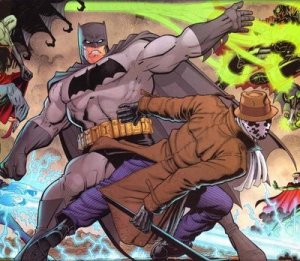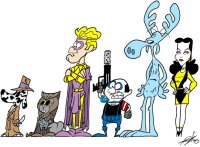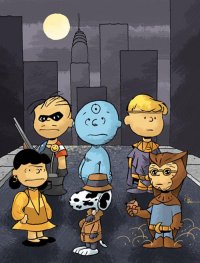Before we get to this week’s reviews…
So, perhaps you’ve heard that DC Comics is going to publish Before Watchmen, a series of “prequels” to the legendary Watchmen, widely (not universally) regarded as comics’ greatest storytelling achievement. And given that, perhaps you wondered if those opinionated gents over at Thor’s Comic Column had any thoughts on the subject.
Well, as it happens…
Adam Prosser: The Watchmen Thing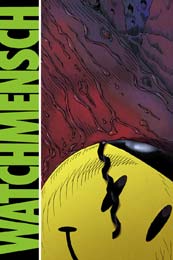
I think it’s important to note that there are several different issues at play here. Let me break them down for you so I can explain why DC making up a series of Watchmen prequels makes me so angry. So very very angry.
First off, there’s the actual quality, context aside, of the books. I notice people, no matter how critical they are of this, are already saying “well, I’m sure some of the books will be quite good, with those creative teams,” but even this seems a little generous. I mean, the artists involved range from good to great, but look at the writing lineup: You’ve got Len Wein, whose presence is at least explainable as a guy who was involved in the original book, and who was a decent writer back in the day, but what little I’ve seen of his recent work hasn’t exactly been earth-shattering. I don’t want to sound dismissive of the guy who co-created Wolverine, but I think of Wein as one of those old school journeymen of the Bronze Age, a reliable writer who could pump out fun comics but never really aspired to anything more; a “company man”, as it were. Please, correct me if I’m wrong.
Then you’ve got Darwyn Cooke, who’s obviously a spectacular talent as an artist and as a storyteller, but who I’m not convinced of as a writer, per se. He works in a certain mode that suits him but doesn’t really fit well with Alan Moore and Dave Gibbons’ dense, idea-packed storytelling. I mean, the last time the guy tried to put his own spin on a classic comic, the result was The Spirit, which was a solid comic but really didn’t live up to expectations, and certainly didn’t do justice to Will Eisner’s vision. I doubt he’ll be able to do better with Watchmen.
And then there’s Azzarello, whose work I’m only passingly familiar with, but what I have read strikes me as solid but unremarkable; and J. Michael Straczynski, who, I’m sorry, is just a flat-out hack.
Maybe being called upon to write a Watchmen story will make these guys step up to the plate and really push themselves to deliver something spectacular, but colour me skeptical. Watchmen isn’t just a great comic, it’s a remarkable, multilayered achievement, dense, intelligent, and packed with ideas. Even at their best, these writers strike me more as the kind who can deliver solidly on one level, delivering stories that you read once and enjoy but don’t return to over and over again. I’d love it if they proved me wrong, but as it is the impression you get is that DC editorial literally just randomly pulled names out of a hat to “keep the franchise going”.
Which is another issue, and it’s where I start to get really steamed. Before Watchmen is clearly, unequivocably, being driven by profit. Well, you might say, of course it is, DC isn’t a charity. But working in a creative field, being a company that produces art in any form, there’s a way to balance profit and achievement in an honest way. The ideal way is that a writer, artist, or other creator approaches editorial with a story they want to tell, the publisher decides to go for it, and the result is a success, a genuine artistic accomplishment that provides entertainment and makes stacks of cash. Even if one or two of these elements doesn’t come to pass, the point is that creativity is driving the product. What isn’t a good sign is when a company decides that it needs to milk more money out of one of its properties and assigns a bunch of journeymen to churn out product…which is obviously what’s happening here.
In a weird way, if this had come from a creator marching into DC HQ and announcing, “I wanna do a bunch of Watchmen sequels!”, even if said creator was possessed of Mark Millar-level arrogance, and even if the result blew chunks all over the industry, I would have less of a problem with it on this level. Because at least the motivating factor would have been someone with a story that they wanted to tell, an actual spark of creativity. Not just a soulless money-generating machine.
Now, I’ve already heard people shrugging this off, or, God help them, defending this nonsense, by pointing out all the times existing characters have been tackled by other creators, or needlessly sequelized. Moore himself, of course, invites criticism by virtue of the fact that he’s been writing League of Extraordinary Gentlemen comics for over a decade now, starring hordes of classic characters. And while Moore’s own statements about this project are problematic for this reason, I think my comments in the above two paragraphs are still valid: there’s a world of difference between a creator deciding to use, say, Dracula, in a story, and a corporation that owns a property and has the ability to give it the mark of validity deciding to “extend the brand.”
And this is what truly pisses me off about this: for over 25 years, Watchmen has occupied a place of reverence in the comic book world; now that’s being cast aside for a quick buck. All sacred cows eventually get slaughtered, of course; that’s the nature of culture, and it’s both healthy and necessary for people to puncture any air of self-importance that starts to build up around a work, no matter how well-earned. But this isn’t being done by some punk-rock rabble-rouser who wants to cause trouble, and thereby enrich comics; it’s being done by a soulless corporation that views this great work merely as grist for the mill. It’s one thing for someone to paint a mustache on the Mona Lisa, as Marcel Duchamp did; it’s another thing to use the Mona Lisa as toilet paper because there wasn’t anything else handy. The former is challenging. The latter points towards a world where art has no value, except in a purely utilitarian sense.
By doing this the way they’re doing it, DC is announcing to the world that Watchmen has no value to them except as a source of money. Yes, the original work is in no danger of being damaged, and will survive long after these misbegotten prequels (I want to remain open-minded, but come on, how likely is it that these will be any better than “OK?”) are forgotten. That’s not the problem. The problem is that the comics industry is in a place where its willing to sacrifice the standard bearer for the idea that comics can be more than cheap time-killers and content farms on the altar of commerce. I don’t care about what this bodes for Watchmen; I care about what it bodes for the industry that would do such a thing.
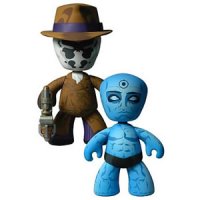 Devon Sanders: Before Watchmen
Devon Sanders: Before Watchmen
So, DC Comics is doing Watchmen prequels without Alan Moore, the guy who’s refused to work with them since 1989 based on some internal logic/principle that only he follows. Frankly, I’m surprised DC waited this long.
Trust me, no one will ever confuse me with someone who sympathizes with major corporations but in this case, I simply must side with DC Comics. Assuming from what I’ve heard about Moore’s dealing with DC, his Watchmen deal was probably brokered by Paul Levitz and/or the late Dick Giordano, both known as notorious straight shooters who looked out for their talent. Alan Moore, willingly (and I stress this) signed a contract that would give him the rights to a book published by a corporate entity. Now, at time, he signed a contract where he knew at the very least, he’d be getting royalties.
Royalties that were freely offered and he agreed to. No one forced him to sign. Moore chose to sign looking at nothing but the upside of rights retention. The only problem I see with the Watchmen deal is his never considering that this major publishing entity would want to retain rights to something they commissioned. Something that upon release was critically acclaimed and sold very, very well. DC, of course, exercised their option to keep Watchmen in print and make Alan Moore a very rich man.
A problem most working writers, like almost every writer or artist who came before him, frankly, would kill for.
Adam Prosser has a counterpoint to Devon’s thoughts:
Hey, it’s rationalization bingo!
Sorry, Devon, but this misses the point on every conceivable level. Moore’s been very clear that this isn’t about money. It’s about the fundamental disrespect being shown to the work by treating it like a commodity. Moore feels, correctly, that Watchmen is a completely self-contained work and should remain so. He feels it so strongly that he’s turned down multiple sweetheart deals and lots and lots of money to make the point. Levitz agreed with him, which is why it took so long for this to happen. Why, it’s almost as if there are people in the comics industry who think that artistic integrity is sometimes more important than money!
I’ve said this before: if some young hotshot creator had come to DC with a plan for a Watchmen sequel, and they’d signed off on it, I might have felt it was the wrong decision, but at least it would have been coming from a legitimate place of creativity. Even if said hotshot creator had said “I hate Alan Moore and want to destroy Watchmen,” that would have been defensible in theory. When an artist riffs on another artist’s work, even if it’s a flat-out insult, at least there’s the acknowledgement that the original work is worth engaging with. This is not that. This is a giant corporation extending its brand. It’s literally looking at one of the shining examples of how comics can actually be worthwhile art, and treating it as nothing more than a potential money hose. And Moore never thought it would come to that, because he signed a contract, as you mention, with human beings. He’s now being fucked, artistically, by the system. Saying “he signed a contract!” is the equivalent of saying that sexual harassment in the workplace is OK because your employer pays you and, hey, you can always leave!
Adam, no disrespect but I think you’re missing the point and reading what I wrote with emotion rather than distance.
Watchmen was entirely “work for hire” with the caveat that DC could, within monthly publication’s end, exercise their option to own what they commissioned.
Adam, I, admittedly know from what I’ve read, put out there what I know, not what I feel.
That’s all. Like I said before, I think most writers would kill to have had his problem.
The difference is that most would have taken it as a learning experience and moved the fuck on. Instead, Moore made it a 20+ year bitch and moan session that I’m genuinely tired of hearing.
He really needs to get over it.
You and I don’t see eye-to-eye, Adam, that’s OK.
I’ll get over it.
Says Adam:
Devon, I’m sorry if I’m being snappish. I am indeed emotional about this, but my emotions are based on my beliefs, which are based on reason, and the fact is that the argument that “he signed a contract, case closed” is a very weak one that I keep hearing over and over again from comics fans. The concept of “work for hire” has haunted the comics industry for decades, resulting in talented creators having their work stolen and destroyed, to no one’s benefit but the gigantic multinationals. And even they are suffering as comics readers tire of the relentless exploitation and tune out in droves. There’s some question over whether “work for hire” is even a legitimate legal concept, as demonstrated by the Siegel family’s successful lawsuit. But even if there is a legal basis for any creator to sign his life away just so he can get his work published, does that make it right? Does that lead to better comics?
Again, though, this isn’t about the money. It’s about DC making the decision to commodify art, which is a decision that will result in some short-term cash at the expense of devaluing one of the great masterpieces of the medium. Look, surely we’re all here because we believe comics are worth something as an art form, right? We don’t think they’re just mindless time-killers, or product to be consumed and immediately forgotten. If that’s the case, then there ought to be creative principles underlying the work that should stand regardless of how much money is involved. There should be some things that are “sacred”, so to speak, and Watchmen seems like it ought to be one of them. You can rationalize these sequels in a lot of ways–they might be interesting! The original work remains unscathed! Etc.!–but if you don’t draw the line here, then where do you draw it?
This is the argument I think Moore is advancing. You can accuse him of being obstinate, but he’s obstinate because they’ve been trying to overcome his principles (and Levitzes’) for 25 years now. It’s not Moore’s fault, it’s DC’s. I’m sorry if you’re sick of hearing about it, but that’s how it works: the people who stand in the way of the system are bound to ruffle some feathers, but sometimes it needs to be done. It’s too easy to constantly shrug our shoulders, keep our heads down, and roll with it, but as long as we keep doing it, both we and the creators will continue to be exploited at every opportunity. Alan Moore may be annoying, but I think the commodification of our culture is much, much worse, so I know what side I’m on.
D.S. Randlett: Thoughts on Before Watchmen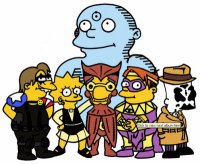
My thoughts are probably the same as yours: Just let it be. Watchmen simply is, and it never needed to be anything else, not even a movie. Anything that anyone could possibly do with these characters, no matter how good, will only stand in the shadow of this greater work.
Many others have been down on DC Comics for this move, and that’s completely justified, but I think that we’re also dealing with a generation of creators and fans that learned all of the wrong lessons from Watchmen. Since then, the medium has been rife with copycats who are nearly obligated to “go dark.” Sometimes this has produced good stories, but most of the time it’s pretty obviously been a simple grasping at an unnecessary tone in order to satisfy the demands of a marketplace that likes to tell itself that it’s matured. We also have many creators out there who are basically aping Moore and Gibbons’ technical achievements.
These things are understandable, it makes since to imitate and learn from successful works of art, but we’ve lost sight of how Moore and his collaborators made Watchmen so great: they found a way in to the story that they were telling. Every ounce of tone, thematic content, or storytelling ability mean nothing next to the honesty that Moore, at his best, brings to his work. A lot of people wonder what makes the giant squid work: that’s it. It’s nothing to do with the plot, it’s Moore’s sharing himself with the reader.
If you are a creator and you want to pay tribute to Alan Moore, just do that one thing: be honest in your work. If you are a fan, demand and be open to honesty.
In the eighties, Moore wrote like a man with something to prove to himself. We, writers and readers alike, could offer no better tribute to the man or to his best known work than to emulate that.
My first reaction to the news was sort of Chuck Heston in Planet of the Apes: “We finally really did it;” with “finally” being the important qualifier: in the backs of our minds or depths of our four-color hearts, we all knew that something like this would happen one day. DC’s getting a lot of heat from the parent company to exploit the living shit out of every property they have, and the fact that their only proven film franchise is wrapping up this year, with Snyder’s Superman still very much an unknown quantity, is probably turning up the heat.
FWIW, I had actually pretty much left comics behind (I do this now and again) in the late 80’s, when mainstream press buzz got me to follow Watchmen (and Dark Knight Returns) in individual issue form; and while I had (and retain) my reservations about some of Moore’s plotting, you’d have had to go back to the 70’s heyday of Tomb of Dracula, Barry Smith’s Conan, Starlin’s Warlock, or Master of Kung Fu to find a time when I was as eager to get my hands on the next issue of a comic. So, yeah, I’m not thrilled by this idea.
On the topic of whether it was “ethical” for DC to do this… well, the contract that Moore and Gibbons signed for Watchmen specified that the rights would revert back to Moore and Gibbons once the book had been out of print for a year. At that time, the idea of a comic book series staying in print in trade paperback form for years, let alone decades, was unheard of, so he and Gibbons would have had some realistic expectation of getting the property back. Whether DC’s subsequent publishing strategy for Watchmen was in any way a deliberate attempt to subvert that (as Moore believed), or whether they had simply stumbled on the property that, along with Dark Knight Returns, was going to essentially create the market for comic TPB’s, is at this point moot. I tend to think the latter is more likely, but I can understand why Moore might not agree.
My biggest problem with the creative side of Before Watchmen is that I’ve never particularly thought there was anything compelling about the Watchmen characters outside of their interaction in that specific story. In a way, they’re less characters than they are placeholders for Moore’s thoughts on, in his words, “…power, and… the idea of the superman manifest within society,” while also getting in a few digs at what the over-reliance on selling superheroes had done to limit the possibilities inherent in graphic storytelling. Moore based his cast on the Charlton superheroes because he knew that DC had recently acquired them, and assumed they were available to be repurposed: had he known, earlier in the creative process, that he wouldn’t be allowed to use them, he could have told basically the same story with a different set of costumes.
The fact that Moore once outlined some ideas for doing Watchmen “prequels” himself is almost beside the point: whatever value those would have possessed would have been as new Alan Moore comics, not as simple commercial extensions of the Watchmen franchise, in the same way that the new 4-CD set of Bob Dylan covers, whatever its virtues as a fundraiser, does not carry the same importance as new material from Dylan himself does.
As others have asked, what’s left to tell? Moore and Gibbons already gave us the two big origin stories, and much of the important background for the others; the comic makes it pretty clear that the interim between those times and the events leading up to Watchmen, was more or less business as usual. So, they do what– fight crime? Eh.
There’s some good creators involved in this (and I love the perversity that we’re now going to see Adam Hughes devoting the same loving attention to Dr. Manhattan’s ass that he gives to Catwoman’s), but this sort of closed-in (on both ends) storytelling would be like creating an entire Star Wars comic universe that can’t venture outside the events between Empire Strikes Back and Return of the Jedi: good, bad or indifferent, it just feels irrelevant.
Plus, Brian Azzarello blew it: when he got the phone call from Didio offering him the gig, how did he not respond: “Raw shark… why would I want to write about…?”
Graig Kent: The Five Stages of Before Watchmen
Denial.
It’s the announcement that has been dreaded by fans for decades, the official notification that, indeed, DC is producing new comics based in the “Watchmen Universe”. Dreaded, and yet expected. Although rumours have cropped up time and time again over the past 25 years, nothing had come of them, but fans and purists have never rested easy.
That dreaded day has come (and gone), Before Watchmen is official, it’s happening, and all that built up anxiety over the mere idea has come pouring out across the internet with all the subtlety of Kool-Aid Man smashing through a brick wall. These books have been in the works for at least two years now, with various members of the creative teams hinting that they were working on something super-secret and mind blowing, but who wants to believe old rumour monger Rich Johnston? When it’s still rumour, it’s easy enough to ignore or to deny. Now that it’s real, it’s almost impossible to deny any longer, although some may try to stay willfully ignorant. Others just get angry.
Anger
Watchmen is a brilliant comic. Flat out brilliant. It is a self-contained masterpiece that revolutionized the industry. In it, the promise of what the medium could be as both mass entertainment and cultural resonator was fulfilled. The map was drawn, the road was paved, we were shown the way. And we folded and refolded that map and abused that road something fierce. Watchmen has been tread and retread upon so many times over the past quarter-century that the only abuse it hadn’t yet faced was resurfacing, stripping away so much of what once made it great but paving it over again with something that looks crisp and new, but is probably of poorer quality, and won’t last nearly as long. Not to mention that the map has been changed altogether and that the road itself, while still a major artery, is just one of hundreds, if not thousands of equal and lesser roads busying the landscape around it.
With so many affronts to the Watchmen legacy over the years, the main feature of the book that kept it relevant was its status as a stand-alone work of art, that it remained its own self-contained world, had its own start-to-finish without any need for supplements. The story was told. That one of its creators had walked away from the publisher and copyright holder forever over, essentially, a moral dispute, lent it an air of both uniqueness and,in a sense, honor. That DC is now diluting Watchmen with these Before Watchmen prequels and “dishonoring” Alan Moore by not adhering to his wishes is to some degree tarnishing the small bits of the original work that had continued to gleam all these years. And there’s really nothing the righteous fan, nor its creators can do to stop it… is there?
Bargaining
You can implore DC not to print these abominations against the holy text.
You can beg the creators involved — from J. Michael Straczynski to Darwyn Cooke to Adam Hughes to Brian Azzarello — to not do the work, to not taint one of the greatest works in the medium’s history.
You can try to convince your retailer not to carry the books.
You can boycott all of the above.
You can do all of these things, but it won’t make a difference. There’s money to be made, as is in every affront to nature and art and the general well being of global civilization… there’s money to be made.
That’s fucking depressing.
Depression
Knowing no matter what you do, how much you complain, or even if you vote with your dollars, that DC is going to make new Watchmen comics because they have every right to do so, is an exhausting thought. They own those characters, and they own them squarely and fairly, at least fair and square for the time at which they were created. Sure, in today’s perspective Alan Moore may have got a raw shake, and although he also has had plenty of opportunity to capitalize upon his creative works and chosen not to, it’s because what he’s interested in is not the money, he’s interested in preserving his creative output. Like a far less litigious Harlan Ellison, he doesn’t fight the system with lawyers but instead by depriving the system of himself, which, itself, is bloody depressing.
As well, DC has made a shit-ton of money off of the Watchmen in the past few years, particularly in leading up to the film when Watchmen trade paperbacks were like proverbial hotcakes, continually on the bestseller list for graphic novels year after year. But that’s not the depressing part. No, the depressing part was the number of people who bought the book, having never read it before, who simply said “yeah, it was good, but I felt like I’d read it before”. Derivative works had surpassed the masterpiece, to a degree, to the point that aspects of its storytelling not only didn’t feel original or groundbreaking to new readers, but didn’t even resonate.
It’s become clear that Watchmen was only meaningful to those who understood it in context, and who care about that context. As an object of both study and worship for the converted, it’s priceless, but for the uninitiated, the layman, the average Joe, it’s just an above average comic book. And that’s who Before Watchmen is for.
Acceptance
From a personal standpoint, I have very little issue with Before Watchmen as a project. Alan Moore left his toys in DC’s sandbox and if he didn’t think they were going to play with them he was fooling himself (or rather, to extend the metaphor, Alan Moore took some of DC’s toys from their sandbox, repainted them, and then put them back). The biggest surprise is that it’s taken this long for DC to get around to playing with those toys again. But it makes sense.
Is the demand there? Not necessarily demand, but the market is. There is a community of geeks and nerds (myself included) for whom the Wednesday pick-up is ritual — most for 15 years or more — that are now, unfortunately, the backbone of the industry. We, generally speaking, don’t want these comics to happen . But for those comics-loving kids who have come after us, rolling around in the playground that Alan and Dave built with Frank and Neil and Grant, amongst others, this ain’t no big deal to them.
They don’t care for Watchmen like you or I do. They may respect it, they may like it, but it doesn’t have the same weight for them. And certainly it holds next to no weight for the average public consumer who maybe dabbles in comics from time to time, or who saw the movie and then bought the comic. With only one Watchmen trade paperback for them to consume, there has long been an absent opportunity to sell them another. For many the one Watchmen book would be enough, but some people just want more of a good thing, even if it’s not as good. Look at it this way… there are still adults watching the Clone Wars cartoon and reading novels and comics based off of prequels to movies that they argue raped their childhood (Stockholm syndrome?). Point is there’s a market, even amongst those that rally against it (to paraphrase David Cross, America has a long and rich history of voting against its own self interest, and nerds do too) and that market will eat almost anything that feeds it. Just remember that sometimes the market chooses to spit it out again.
Before Watchmen doesn’t need to exist, but its going to. There will be the devout who refuse to touch it, who will blindly defame and denounce it, slander it to degrees previously unknown, and to them I say more power to ya. But is it really worth the effort? I agree though, shitting on things can be fun, but perhaps building up something else might be worth your efforts more. At least balance it out, for every negative comment about Before Watchmen try saying something nice about another comic project….
There are no Holy Grails in modern culture. Nothing is sacred anymore, and there are very few works out there that haven’t been tainted by some commercialization. Of modern works, Calvin and Hobbes is about as pristine as it gets (and they even have those bootleg “pissing on FORD” stickers that equally piss on its reputation) because Bill Watterson had full creative control and ownership, something Moore has never had, and thus shouldn’t expect. We don’t need other people making new Peanuts comics, we don’t need a shot-for-shot remake of Psycho, but we’ve got them all the same. Do these derivative works truly damage the original, or do they just pale in comparison (or conversely does their lesser quality make the originals shine brighter)? Shakespeare is butchered time and time again in retelling and adapting his play, often for profit and just as often by well-meaning individuals, he’s just fortunate enough to not be alive to see it. But on the flipside, Shakespeare is just as routinely paid tribute to and honored by derivatives and variations to his work. It doesn’t all have to be bad.
Let’s face it, most of us nerds are going to, at least out of sheer curiosity, take a look at what’s being done, and there’s little to no doubt in anyone’s mind that these books, like a comic book prequel or sequel to a major motion picture, aren’t going to live up to the source. If you don’t want them, don’t buy them, but don’t let it ruin your day. If you do get them, and derive some enjoyment from them, well, then they’ve done their job.
The creators who are attaching their names to these projects realize that they’re in for probably the roughest gig of their lives, and that the work they do is going to be scrutinized to the level of Star Wars Prequels (and perhaps beyond). At the same time, this is going to be one of the biggest projects of their careers, and if they can make it successful, if they can turn a cold shoulder into a warm reception, they’re going to be heroes, and they’re going to strive for that. I could be wrong. There could be anarchists in the mix who just want to fuck with history, and capitalists who just want to get paid, and fame whores who will take derision and adulation as their fix in equal measure, but I sincerely believe that anyone doing these books is not treating it as just another assignment but a highlight. I don’t think they’re ever going to be essential (but who knows), but there may be something of value (entertainment, or artistic, or otherwise) to what they’re doing, not just defacing the Mona Lisa with a Joker smile.
Now let’s see… who hasn’t chimed in on Before Watchmen yet…
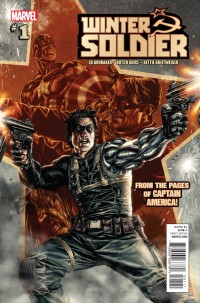 Winter Soldier #1 (Marvel Comics, $2.99)
Winter Soldier #1 (Marvel Comics, $2.99)
By Bart Bishop
So this week we’re all reeling from the announcement of Before Watchmen: seven mini-series covering all the main characters, an epilogue, and a back-up pirate comic (just like in the original!). It’s easy to be cynical, and my comrades Adam and Graig have covered the subject pretty thoroughly. They discuss how there are no “sacred cows” or “Holy Grails” in pop culture, and how this announcement has not only resulted in obvious outrage but dulled indifference or outright support. I’m not here to defend Before Watchmen; it’s wrong and seeing contemporary, familiar artists such as Adam Hughes, Jae Lee, and Darwyn Cooke interpreting these familiar characters is seriously creating an uncanny valley for me. I am here, however, to discuss a former sacred cow that was slaughtered six years ago: James Buchanan Barnes, the former Bucky/ex-Captain American and current Winter Soldier.
There used to be certain things you just don’t do in comics (as evidenced by this funny video). Uncle Ben stays dead; Jason Todd stays dead; Bucky…stays dead. Obviously two of those three things have not stayed true, with varying degrees of quality, but it’s hard to deny that Ed Brubaker hasn’t done something beautiful with this character. During a classic, still ongoing tenure on Captain America, he managed to not only legitimize the decision to bring Bucky back but also craft one of the most fascinating, engaging portrayals of post-traumatic stress disorder and redemption ever in comics. The Winter Soldier, quite frankly, is one of the best characters in mainstream superhero comics.
It was an uphill battle. Not just the resurrection, which like many before turned out to not be a resurrection but an “everything you know is a lie” as Bucky hadn’t actually died. The Soviet Union, specifically Department X, found him drifting in the arctic waters and nursed him back to health in a perverted reversal of Captain America’s own salvation in 1964’s Avengers #4. Arm blown off, Bucky was equipped with a robotic prosthesis, not unlike Cable or any other generic offspring of the ‘90s. He also had a ridiculous head of long hair. His initial appearances outside of Brubaker’s work had him intimately tied to Wolverine (of course) and half of the rest of the Marvel Universe’s characters and major events. Even in Brubaker’s title he had a past with the Black Widow. All of this adds up to the deck being stacked against Bucky; he reeked of creative bankruptcy, the proverbial cash cow.
Winter Soldier #1, however, is anything but a cash cow. It’s earned; the natural progression of long form storytelling and brave decisions. Here we see the title character and Natasha Romanoff, the Black Widow, in Las Vegas investigating the Russian Mafia and an offshoot of A.I.M. called R.A.I.D. Three Sleepers, former KGB assassins kept in stasis tubes for years between jobs, have been freed. This is personal for Bucky, as not only were they used by the Soviet Union the same as he was, but they’re his former students. By the end of the issue there are startling revelations, including a gorilla with a machine gun, and a thriller of a cliffhanger that hints at this title’s connection to the greater Marvel Universe.
Brubaker’s script is accessible and economical. This is, obviously, a character with a lot of baggage, but in a few pages the current status quo is lain out and any pertinent information is supplied. There’s a sense of history here, not continuity. The thrust of the narrative, the sleeper agents, ties in naturally to the Winter Soldier’s origin allowing opportunities for Bucky to flashback and meditate on his past while accessing the present. There’s also a helpful exposé halfway through the issue, showing a 24-hour News Network discussing the character’s enterprises: from his time as a WWII sidekick to his shady days with the KGB, to taking up the mantle of Captain America in his Steve Roger’s absence and recent “death”. That, in of itself, was a controversy in the comics community, as fans cried foul when Bucky was thought to have died during the big crossover event Fear Itself. When he was shown to be alive in nary a few months (much like recent life-challenged occurrences with the Human Torch and Thor), fans cried foul again at the cynicism and manipulation of Marvel’s tactics.
As with DC Comics, Marvel is a business. Brubaker, however, is a writer I trust. Much like I know he always intended for Steve Rogers to be thought dead (after Civil War, for about three years) so Bucky filling in could play into the latter character’s redemption angle and the former character gaining perspective, Bucky faking his death after Fear Itself was always meant to segue into this series. Bucky has a clean slate now, but his nature is not to be in the spotlight or be a member of the Avengers. I’m sure in time he’ll be revealed to be alive to everyone other than Steve, Natasha, and Nick Fury, but for now being incognito plays into themes of this series: wetworks, the dark underbelly that keeps the gears of the Marvel Universe greased.
The artwork by Butch Guice is suitably shaded and impressionistic. His characters have athleticism to them without being overwhelmed with muscle. His handling of body language speaks volumes, as it’s obvious the Black Widow and Winter Soldier are dangerous and formidable, and also a great team. Brubaker and Guice shine in this department, as although Bucky is the protagonist this is really a duo. This is familiar ground for the Black Widow, as her relationship with Daredevil led to an infamous run in the ‘70s when they moved to San Francisco. Brubaker doesn’t write Black Widow as a subordinate, however, giving her intelligence and a calm collection balanced by the casual banter with the title character. There’s chemistry here, which Guice picks up the ball and runs with in a cinematic fashion. From the use of angles and silent contortions to evoke speed and grace, to the maturity of a sensual love scene (interlaced with violent flashbacks) that doesn’t resort to cheesecake, Guice’s style is refreshing. It’s adult without being grim & gritty, without reveling in the grime.
So Marvel took a chance six years ago, and this is the culmination of all that. My only criticism is the cliffhanger, while exciting, is rushed and predicated on knowledge that may baffle the casual fan. Latveria and Doctor Doom play into this cliffhanger, and two mysterious antagonists who startle with their physicality but baffle with what little textual background is provided. Although this is supposed to be the payoff of the mystery the Winter Soldier is tangled up in, it assumes a lot from its audience. As first issues go this reads as a strong introduction, but the cliffhanger is more of a question mark (one can assume the second issue will expand upon) than an exclamation point.
DC is taking a chance, but there’s an inherent difference between Before Watchmen and The Winter Soldier. Before Watchmen is working within the confines of an already established work, a work that the majority accept as being insular and complete. A few months ago I discussed personal continuity and how that relates to Watchmen. Back in the ‘80s Alan Moore worked on an RPG Watchmen game, writing an essay for it that expanded on the background of the characters (and will probably be the basis for these mini-series). Moore himself discussed prequels. There’s already been a prequel video game tie-in to the movie. There were already cracks in the dam, but up until now the cracks were left alone. Now the dam is broken. How is that any different than what Brubaker has done with the Winter Soldier? Brubaker may have filled in a few gaps, adding details to Bucky’s past, but he’s used that to propel the character forward. Everything in Winter Soldier #1 is a product of Brubaker’s creation, original and imaginative and exciting, except for the core basis and elements of aesthetic. Before Watchmen won’t be anything new, but more of the same.
The cold, hard truth is that I don’t want to know more about the lives of those characters before 1985, because they were losers. They were cosplayers enacting imagined adventures, where the best nemesis Rorschach can find is a magician with pointy ears. That sandbox is simplistic, a world almost identical to ours except for two things: Dr. Manhattan and Ozymandias. They change the world, and the original graphic novel depicted the most exciting adventure of their lives. A sequel, although an equally shrewd business, would at least have offered progress.
Nothing ever ends. Or as another zen-like being said, “It only ends once. Everything that comes before is just progress.” The Winter Soldier #1 is progress.
4 ½ out of 5 Stars
Hey, was that a great segue from discussion of Before Watchmen to our regular reviews or what?
Red Lanterns #6 (DC, $2.99)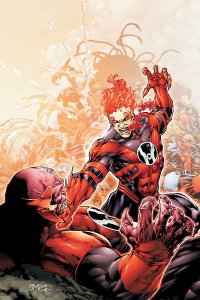
By D. S. Randlett
There are certain series that you just can’t look away from, no matter how much they can disappoint. On the one hand, you have books that call upon a certain sense of nostalgia that all fans of something fall victim to. Red Lanterns is something else. This is a group of characters less than ten years old, so any likelihood that current comics readers have any nostalgia for them is nonexistent, so that’s not really a factor. Rather, it’s that the series comes just close enough to interesting on a thematic level that it’s just so tempting to pick this book up month after month to see if it really breaks through. So, it’s not nostalgia that keeps me coming back to this title, but it might be something just as irrational.
Oddly enough, Red Lanterns flirts with being about being driven by the irrational. The Red Lantern Corps originated in Geoff Johns’ run on Green Lantern, along with various other colored corps, each one powered by a different aspect of the emotional light spectrum. Red is rage, and boy do these guys rage. Before this series, the only Red Lantern capable of thought or speech was the first Red Lantern, Atrocitus, who was driven by a vendetta against the Guardians. The rest of the Red Lantern Corps is driven mad by the rage that attracted the ring to him or her. They do have the lamest set of Lantern powers, though. They can’t make constructs (because they’re too angry to think, see), but to compensate they can belch out this ridiculous all-consuming napalm vomit stuff.
In previous issues of this series, Atrocitus has brought some more Red Lanterns into his fold, inducting some members of his corps back into self consciousness. This ends up being a godsend for the series, as the stories behind these Red Lanterns actually contain a fair bit of pathos. If these people hadn’t have suffered what they have, they might be better people. They might be happy. Or maybe not, as the sixth issue of Red Lanterns reveals the first human Red Lantern, who has not suffered a singular tragedy so much as a lifetime of suppressing his own anger. What’s different about this man is that he’s able to hold onto his mind against the Red ring, which is something that could yield some interesting fruit down the line.
But will it? For all of its flirting with theme, this is a hard series to recommend wholeheartedly. The dialogue is often clunky, and the story has been spread far too thin so far. I feel like the information expressed in the past six issues could have easily been expressed in three. The art is also uneven, with some truly awful character design here and there. Then again, the superhero look is just all wrong for this book, which calls for something a bit more horrific.
I don’t know how much longer I can wait on this book, but then again I don’t know that I can look away.
Two and a half stars.
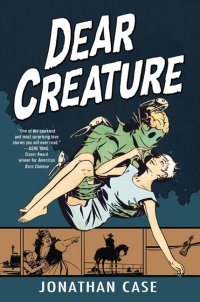 Dear Creature (Tor, $15.99)
Dear Creature (Tor, $15.99)
by Graig Kent
It’s been a while since I’ve been truly surprised by a comic. It’s my own fault though, not comics. I’ve gotten complacent the past little while, not branching out like I once used to, experimenting less with the fringes and targeting known commodities… not just DC and Marvel, or licensed properties like Buffy and G.I. Joe, but also sticking to writers and artists who I know won’t let me down. After years of being in this reviewing game, largely on my own dime, I’ve been bitten far too often, wasting my money on books that aren’t barely worth the coin (see my A.D.D. review last week, for but one example) and frequently not even worth the words I’ve spilled over them. So much of my weekly budget was eaten up the past five months by the New 52, an audacious, attention-getting experiment on DC’s part that has largely worked in drawing crowds and stifling much of the pre-launch criticism, but with the weaker series revealing themselves, I’m finding my pull numbers returning back to normal, thus some wiggle room to fish around a little, to find the trash floating at the top (*cough*A.D.D.*cough*) and also the jewels at the bottom of the sea.
Dear Creature is just such a gem: a stunningly entertaining, beautifully illustrated, perfectly realized first-time effort from creator Jonathan Case. It was only a few days ago that I realized Tor, the publishing company known largely for its fantasy novels was even publishing graphic novels, then to happen across this a day later was some kind of kismet.
Here is a romantic comedy (more in classic cinematic fashion than the Heigl/Lopez sense) starring a wide-eyed, Black Lagoon-esque creature named Grue who yearns for a romantic connection. Having learned of the surface world and its language after reading discarded works of the Bard, his longing is so strong that he’s willing to curb his penchant for eating humans in hopes of wooing a mate (much to the chagrin of his chorus of bawdy crab friends). Though there is naturally a miscue in the onset, he does eventually find that romantic partner in Giulietta, an agoraphobic Italian immigrant who lives in a cabin on a dry-docked sailboat at an appropriately sleepy seaside town. Of course, their courtship isn’t going to come easy when Giulietta’s nephew is accused of a murder of which Grue is kinda-sorta guilty.
This is an over-simplified description of the richly characterized, compact environment which Jonathan Case has created. Outside of Grue, Giulietta and the crabs, there are the men of the Sheriff’s department, Giulietta’s sister and nephews, and a few other pop-up stock characters, including a giant squid (and who doesn’t love a giant squid). The nuances of the book, like the relationship Grue has with his crab friends, the fact that Grue speaks in iambic pentameter, the relationship between the Sheriff’s deputies, and Giulietta’s immigration story, are all deftly constructed and wonderful to behold, at times comedic, and others touching, each moment completely and honestly earned.
Case’s illustrative hand is a marvel, for a debut effort he’s showing every confidence in his storytelling with nary a flaw, getting better with each turn of the page. Printed in glorious black and white, Case uses crisp, solid ink with only purposeful lines, no additional cross-hatching or gradient shading, his cartooning style reminiscent of greats like Jeff Smith, Paul Smith and Darick Robertson, yet still in his own fashion. Naturalistic and expressive, his characters all have their own body language, especially Grue who moves like he’s without bones. At the same time, his beachfront world is exquisitely realized in rich details, capturing the Frankie-and-Annette feel of the 60’s to a “T”, in fashion and setting.
Having to follow up a debut as captivating as this is going to be an exceptionally tough challenge, so I’m not envious of Jonathan Case. Except that I am. This is the harbinger of a major talent entering the comics landscape, and I’m sure that sophomore effort is going to be just fine. A genuine surprise. Did you catch that?
5 out of 5 stars.
The Twelve #9 of 12 (Marvel, $2.99)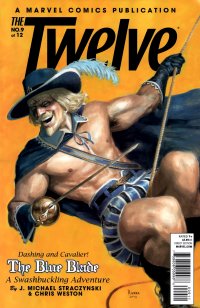
By Jeb D.
I suppose it’s more or less obligatory to begin a review of this comic with some reference to the ridiculously long delay since the last issue… so I’ll simply point out that the “amazing future” that our WW2- era heroes have found themselves in is… 2008.
Given the interregnum, a quick recap: a set of Golden Age heroes, placed in suspended animation at the height of WW2, is revived in the 21st century, and they attempt to acclimate to a world as alien to them as they are to it. Eventually allowed by the U.S. government to reveal themselves publicly, the twelve find adjustment difficult, and the group fragments, each following a course that may lead to celebrity (the Errol Flynn-like Blue Blade), the pursuit of vengeance (Black Widow—no, not that one: think Veronica Lake in black leather), a quest for knowledge (the Phantom Reporter, more or less our guide into the story), and varying forms of madness.
As you may guess from the cover, Blue Blade is more or less at the center of this issue, as his television career runs careening into the mysterious mechanical Electro, whose seeming ability to act without human guidance forms the core of this issue’s mystery. We finally see the events leading up to Blue Blade’s death (which was shown in issue #1), there are surprising revelations from several quarters, and plot threads gather steam as we head toward the climax. Number 9 of 12 is obviously not an ideal jumping-on point, but this issue’s focus on a small group of the cast makes it easy to follow, even for new readers: it combines the clarity of a good standalone comic with the depth of an intriguing long-form limited series. And needless to say, if you’ve been intrigued enough to read for eight issues, #9 won’t be a letdown.
What elevates The Twelve over a lot of other post-Watchmen (hey, that again!) deconstructions is the hyper-realism that artist Chris Weston brings to what is his finest work so far. He creates a world of textures so believable you could live in it, faces that are distinct and instantly recognizable (with a touch of Gary Frank insanity in some of the eyes), and with an edge of unease that underlies even its simplest, most expository moments. He clearly has a great time whenever called upon to flash back to the heroes’ WW2 storylines, and the sequence where the Phantom Reporter begins to relive Electro’s “memories” is a gorgeous piece of storytelling that could nearly stand on its own. Dynamic Man’s descent into a baseball stadium at night is a breathtakingly beautiful image, and Weston’s depiction of the rain-soaked Phantom Reporter, his garish costume now a wet, soggy mass, standing over the blankly-staring corpse of the Blue Blade, is ridiculous, determined, and poignant, all at once.
J. Michael Straczynski’s script is his usual mixture of the inventive (Dynamic Man’s bullet-catching stunt, the mystery of Electro’s coming to life) and the tiresome (the obligatory whining about how the world has changed since the days of the Greatest Generation, which ought to have been over and done by about issue 3), but even in its most trite moments (and there really aren’t that many), Weston always bails out the script. With three issues left, I’m hoping that Straczynski can stick the landing, but either way, I can’t wait for an oversized hardcover edition of this amazing-looking book.
FOUR AND A HALF STARS
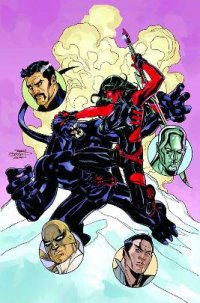 The Defenders #1-3 (Marvel, $2.99)
The Defenders #1-3 (Marvel, $2.99)
By Adam Prosser
There was a time when wonders walked the Earth, when everything was strange and new, when it seemed like anything could happen. It was a time called…the 1970s.
Back then, Marvel was still new enough, and still creator-oriented enough—and, OK, editorial control was lax enough—that a unique talent could steer these corporate-owned characters in some really strange directions. Thus it was that Steve Gerber emerged as an idiosyncratic voice at a time when Marvel was largely in thrall to the previous decade’s formulas. Gerber didn’t seem to take superhero comics very seriously, which made him unique in the increasingly solemn comics culture (I’d argue that the early Bronze Age is where the idea that superhero comics should be “serious” and “realistic” started to really take root), and that playfulness produced some pretty wild stories that still don’t read like anything else superhero comics ever produced.
When the Defenders were introduced, the premise seems to have been simply to team up some of the most powerful beings in the Marvel Universe (Dr. Strange, Namor, the Hulk and the Silver Surfer, initially) who also happened to be characters who typically kept to their own agendas. When Gerber took over the title, he added another layer: his Defenders would be weird. His run included multiple teams battling over who got to be called “The Defenders”, a character forced to carry around his own brain, and perhaps most memorably, a completely random series of vignettes involving a murderous elf with a gun, which never connected to the main storyline. It’s one of comicdom’s best running gags.
As is frequently the case, a run of comics this distinctive is forever going to cast a shadow over any revival. Now, however, Marvel’s made the decision to bring on Matt Fraction, who could be considered one of Gerber’s spiritual heirs, to write a new series. It begins with Hulk tracking down Doc Strange to plead for his help in bringing down the newly-unleashed “Hulk’s Hulk,” Nul, Breaker of Worlds. Hulk wants to retain “plausible deniability” (as if pleading for help wasn’t uncharacteristic enough) so he’s replaced with the Red She-Hulk on the team that otherwise includes the usual Namor, Silver Surfer, and the newly recruited Iron Fist. Their quest takes them to a lost kingdom ruled by the legendary Prester John, who, as it turns out, wants to draw Nul to him for reasons that have something to do with ending the Universe. Also, there are Tiger-men.
This book is being sold as “The Defenders are weird again!” but I was struck by how fairly straightforward this story is. There are a lot of quirky touches, and of course it involves stuff like Tiger-men, but that’s really no odder than superhero comics usually get. But that’s OK! If Fraction isn’t lighting the world on fire with boldly experimental storytelling and mind-bending concepts, he’s at least brought a remarkably fresh feel to what could have otherwise been a rote team book. Fraction’s voice is light-hearted, his storytelling is clear, and his characterizations are highly effective—this would actually be a great introduction to any of these characters if I didn’t already know who they were. There’s also something…“graceful” about the book, for lack of a better term. There’s been a feeling of heavy-handedness about a lot of the mainstream superhero comics I’ve read lately, but this book feels self-confident and fast-paced. Fraction gets to the heart of any given scene quickly and effectively, and then moves on. Of course the artists, Rachel and Terry Dodson, deserve a lot of credit for their clear storytelling and expressive characters as well. The result is a book that’s an oddly joyous read, and in the end, that’s really all you can ask, isn’t it?
Still. If the Elf With a Gun shows up, that would really kick things up a notch.
FOUR STARS
